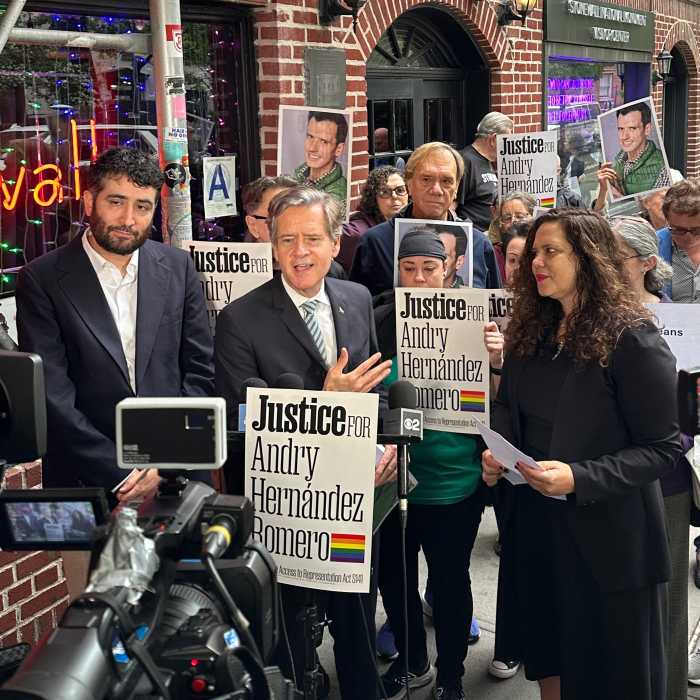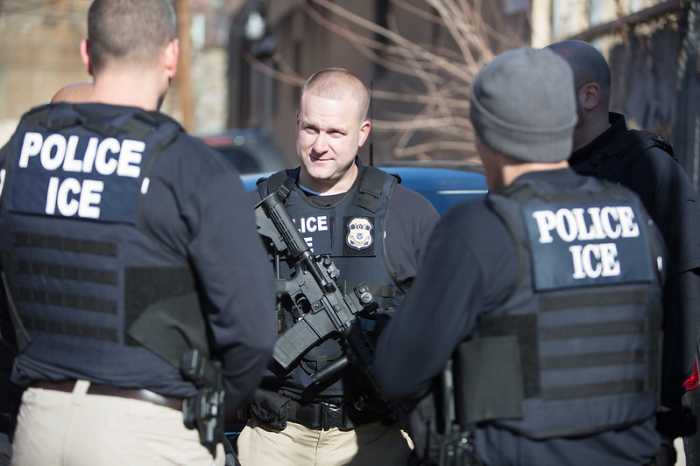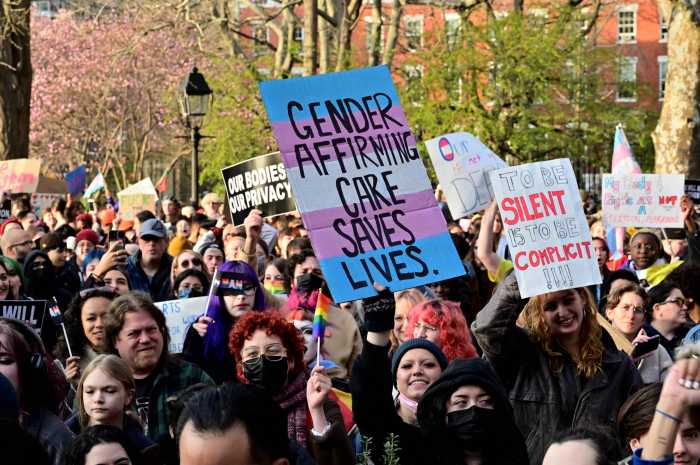The February 22 decision by New York’s LGBT Community Center to cancel a party planned to mark Israeli Apartheid Week (IAW), an annual international mobilization by critics of the Jewish state’s treatment of the Palestinians who live in the territory it controls, has sparked outraged response from many LGBT New Yorkers, including a good number of prominent Jewish lesbian and gay activists — but has also won support from other progressive Jewish gay leaders and journalists.
At the center of the controversy, however, is someone who has never been shy about voicing his disconnect from Western progressive circles — gay adult film producer Michael Lucas, a self-described atheist Jew who is also an unabashed booster of Israel.
It was Lucas’ letter to the Center’s executive director, Glennda Testone — accompanied by a threat to organize a boycott of major donors — that within a day resulted in the Siege Busters, a group working to raise funds for a new flotilla to challenge the Israeli navy’s blockade of the Gaza Strip, learning that its March 5 Party to End Apartheid! could not be held at the Community Center, and that, in fact, it could no longer meet there as it had been doing since last summer.
“If the LGBT Center wants to host a fundraising and awareness party for anti-Semites,” Lucas said in a statement he released as part of the effort to put pressure on the Center, “they might as well go all the way and host a tea dance for Fred Phelps.”
Lucas’ linking of IAW to anti-Semitism — a charge leveled by many defenders of Israel against a movement whose mission is BDS: boycott, divestment, sanctions — proved particularly stinging to the organizers and supporters of the Center event, many of whom are Jewish, when it became clear that the accusation apparently had traction with Testone and her board.
As a columnist for the Advocate, in interviews in other publications, and in speeches on college campuses around the country, Lucas, a refugee from what was then the Soviet Union, has cut a distinctly right-of-center profile, often betraying barely concealed contempt for what he clearly sees as the softness of the US and European left.
In two recent interviews with Gay City News, Lucas disparaged “Obamacare” by pointing to what he said was the “joke” of health care in the Soviet Union and scorned “those ladies who are so proud to call themselves socialists” — referring to defenders of the IAW event.
He has also been a harsh, even inflammatory critic of Muslims. Writing last summer of the proposal to build an Islamic cultural center several blocks from the World Trade Center site, Lucas said, “Let’s not fool ourselves: This monstrosity is designed as a demonstration of political Islam’s ascendancy. And the ambiguity between secular and religious purpose mirrors precisely the strategic use of religion by Islamic politicians — the way they use religion to keep their people quiet and make their imprint on the world.”
In another Advocate essay about the Muslim Army psychiatrist arrested in the killing of 13 at Fort Hood last spring, he wrote, “We knew he simply carried out the order of his guide, the Koran.” While now saying, “Anything under the sun is possible,” Lucas told Gay City News that Islamic faith is essentially incompatible with US military service.
He insisted, however, that quotes attributed to him on the blog queerty.com — “I hate Muslims, absolutely. It’s a horrible, horrible religion. It’s a plague.” — were taken out of context from an interview elsewhere. “It’s not that I hate these people,” Lucas said of Muslims in speaking to the newspaper this week. “I hate what their system has done to them.”
Stunned by the Center’s abrupt decision to rescind their March 5 space reservation, Siege Busters scrambled to mobilize their supporters in the LGBT community. By March 1, an online petition protesting the Center’s action had garnered more than 1,300 signatures — including community stalwarts such as Matt Foreman, the former executive director of the Anti-Violence Project, the Empire State Pride Agenda, and the National Gay and Lesbian Task Force, the Reverend Pat Bumgardner, pastor of New York’s Metropolitan Community Church, and Scott Long, who formerly headed up the LGBT desk at the Human Rights Watch.
Comments posted on that petition and contained in a press statement this week address not only the substance of IAW’s critique of Israel’s Palestinian policy – and Lucas’ charge that it is no different than anti-Semitism — but also important questions about what being a community center means exactly and what role major financial supporters should play in defining that mission.
Even as many among those 1,300 signers voice common themes about those issues, other progressive leaders in the LGBT community — including Stuart Appelbaum, president of the Retail, Wholesale and Department Store Union, and Steven Goldstein, who chairs Garden State Equality, New Jersey’s LGBT advocacy group — speaking for themselves, not their organizations, have endorsed the Center’s decision.
The biggest lightning rod in the controversy is Lucas’ charge that anti-Semitism is at the heart of IAW. Brad Taylor, one of the principal Siege Busters organizers, said the group has, as part of its mandate, an express condemnation of racism and anti-Semitism. Taylor’s position was echoed in a number of protest letters sent to Testone.
Joan Nestle, the longtime activist who was a co-founder of the Lesbian Herstory Archives, wrote, “To critique Zionism as a form of extreme nationalism is not anti-Semitic; it is a valid analytical response to a nation state that acts with great power in its part of the world.”
University of California at Berkeley queer theory scholar Judith Butler wrote, “There are increasing numbers of Jewish intellectuals and cultural workers (including Adrienne Rich and myself) who support the BDS movement, including a vocal group from Israel that calls upon the rest of us to put international pressure on their country.”
And journalist and author Donna Minkowitz said, “I have seen no evidence whatsoever that this organization is anti-Semitic. Barring them simply on the basis of an opposition to the policies of the government of Israel is a chilling and terrible curtailment of free debate. As a Jew, I’m especially horrified by this decision.”
But Goldstein, Appelbaum, and others see the matter differently and applaud the Center for its responsiveness to the sensitivities of what they view as the large majority of LGBT Jewish New Yorkers. Their perspective is represented in starkest terms by Benjamin Weinthal, who is a Berlin-based Gay City News contributor. (Full disclosure: Gay City News contributors have not been immune to the passions of this debate. In addition to Weinthal, another contributor, Yoav Sivan, to a different degree, has questioned the IAW event, while longtime reporter Andy Humm, international contributing editor Doug Ireland, columnist Susie Day, and associate publisher Troy Masters have all signed the petition criticizing the Center.)
In defending Lucas’ charge of anti-Semitism, Weinthal wrote, “Mainstream critics, like the Anti-Defamation League and the American Jewish Committee, et al., would, based on my talks with these groups over the years, characterize the Israel-equals-Apartheid analogy to be a form of contemporary anti-Semitism, largely because it de-legitimizes Israel… In short, if Israel is an illicit regime (like the Nazis and the racist South African Apartheid regime), according to the logic of the Apartheid Week folks, Israel deserves to be abolished.”
Asked about the “de-legitimizing” frame on the issue, Goldstein, who is also a rabbinical student and took great pains to emphasize that the views he expressed are wholly unrelated to his LGBT advocacy work, said, “I find it impossible to separate Zionism and Judaism. Those who try to separate them don’t have a clue as to what Judaism is all about… To call it an apartheid state, that is meshugge. It is a word designed to hurt and designed to de-legitimize the state of Israel.”
Appelbaum was more succinct: “We would not have tolerated a synagogue allowing its facilities to be used for homophobic events. So why should we tolerate the Center being used for what is really an anti-Semitic event?”
Weinthal has gone so far to argue that Jewish support for IAW represents “self-loathing,” a view echoed by Lucas, but one that Sherry Wolf, a Siege Busters organizer and the associate editor of the International Socialist Review, said was “slanderous.”
Sivan, a journalist now living in New York, who worked for the Knesset and was the LGBT coordinator of the International Union of Socialist Youth while in Israel, offered a more dismissive view of the thinking behind IAW, saying, “My take is that Americans do not appreciate that an important political debate is debased by reckless epithets such as ‘Apartheid.’ Come to think of it, the whole of idea of a party to end Apartheid is grotesque. What’s next? A poolside orgy against racism?”
Among those who have signed the Siege Busters online petition, just as important as the underlying debate over Israel and its Palestinian residents is the question of how the Center made its decision.
In a statement released on February 24, Testone explained, “Upon receiving feedback from a number of Center members and constituents with a variety of opinions on this event, the Center had to consider how renting space to this particular group was interfering with our primary focus of service to the LGBT community. The group is not LGBT-focused, nor was the event focused on LGBT people or issues. As a non-LGBT issue began to distract from our core mission, we asked the group to move the event.”
Taylor voiced disdain for that rationale, saying, “The Center has always been a communitarian space, hard won by queer activists. Its inception was explicitly anti-exclusionary.” Siege Busters, he said, is “a queer and straight group working above board against the Israeli occupation,” something he noted was never hidden during all the months the group was welcomed at the Center.
Lisa Duggan, a professor of American and gender and sexuality studies at NYU, wrote, “I have heard there is a claim that these groups are not wholly LGBT groups? Well neither was ACT UP, or the many 12-step groups, or many other associations of allies with LGBT members who use the Center and support the LGBT community. Apparently support of Palestinian queers is not within the purview of the Center?”
Lucas was particularly vehement in rejecting the argument that IAW has anything to do with standing shoulder to shoulder with the LGBT community’s brothers and sisters in the Muslim world. That justification, he said, has arisen ex post facto in response to his actions.
Leslie Cagan, a longtime peace activist, picked up on Taylor’s discussion of the Center’s tradition of diversity, writing, “The Center has always been one of the few places in New York City where all parts of the queer community have been welcome, and where our allies and friends have also found a safe space. Our community, indeed the nation as a whole, needs to know we can have open and fear-free discussions about so many important issues. Now is not the time to slam the door shut.”
Lucas has surely not helped his cause with his critics — nor eased the discomfort the Center might currently be feeling — by his chest-thumping over his ability to mobilize the threat of a donor boycott. In fact, in emails following an interview with Gay City News, he forwarded messages that funders had sent Testone, including one from Jon Wilner, a Fire Island Pines realtor, who wrote, “I completely agree with Michael Lucas. Until further notice, I will withdraw my contributions and my support of the LGBT Center.”
“This is checkbook activism at its very worst,” longtime AIDS activist Sean Strub, the founder of POZ magazine, wrote in an email to Gay City News.
“This breach of the open policy of the Center is an ominous sign that LGBT community institutions are subject to unilateral control by wealthy donors — the Center in this case did not even open a dialogue with your other constituencies,” NYU’s Duggan wrote.
Testone responded to Gay City News’ questions about the role of funders in her verdict by writing, “Our decision was made with input from key internal and external constituents representing broad points of view and after careful consideration by Center leadership and the executive committee of our Board of Directors, as representatives of the full board… We heard from donors and other constituents on both sides of this issue.”
As of press time, Siege Busters had not yet determined its next step in this fight, though Taylor vowed, “We intend to have our party at the Center…. We expect to make [Testone’s decision] not stand.” The group’s organizers had a strategy phone call scheduled for late in the evening of March 1.
One positive that may yet come of this controversy — even if the battle over the party cannot amicably be resolved — is the Center’s apparent willingness to open up its decision-making approach to such questions going forward.
“We are in the process of planning an open meeting within the LGBT community to address how we can create a more robust and transparent space-use policy,” Testone said in a March 1 email to Gay City News.


































